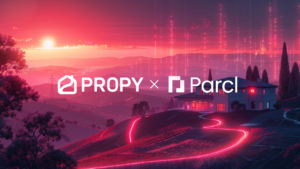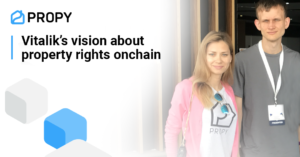How often do you shop online? How often do you pay with your credit card? If the answer is almost every day, then how would you feel if you could buy or sell a home entirely online, with just a few “clicks.”
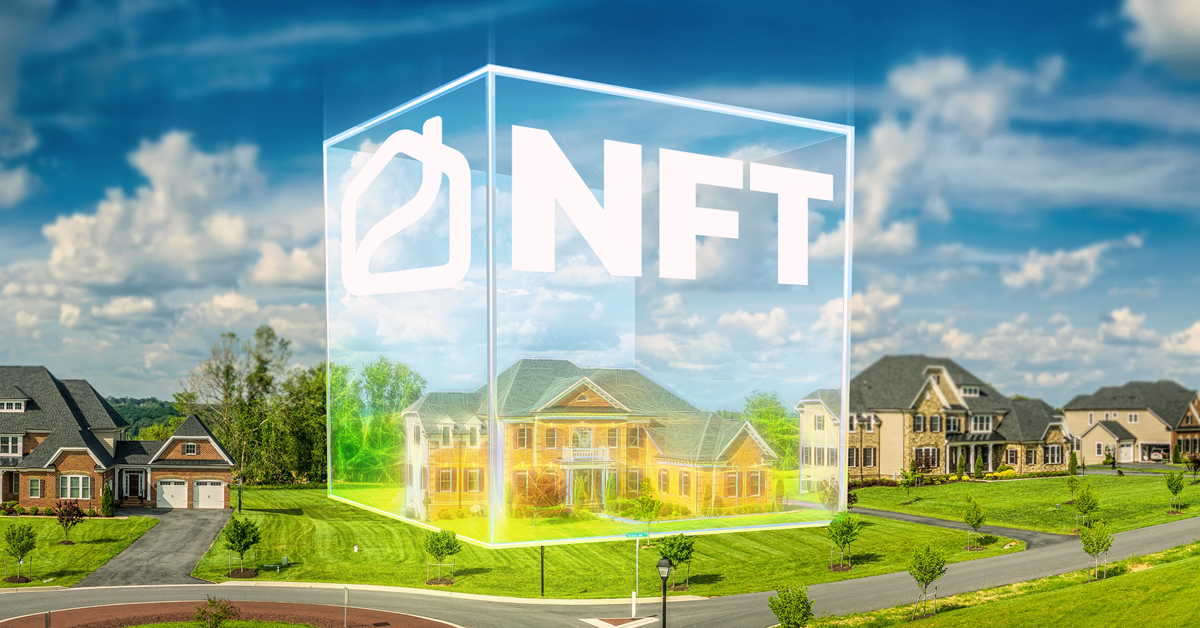
“Is that even possible?” you ask. It is, thanks to Propy, a company determined to simplify the real estate transaction process. How does it work? Well, it involves using a new technology that’s been in the news A LOT recently – an NFT.
Buying and selling a property with an NFT is…
Fast. The process is handled automatically and online, eliminating the need for multiple people and middlemen to handle specific actions.
Secure. The information about the property is listed on the blockchain.
And more…
But before we do that, let’s review some of the key elements and terminology involved with this new technology.
Blockchain
Blockchain is the structure that all cryptocurrencies and NFTs are stored on. In essence, a blockchain is a database that stores information in a series of data “blocks” connected together in a “chain.”
Applications and technology built on top of a blockchain use a process called a “smart contract” to perform actions – if certain criteria are met, then a specific action is taken. This means that activities which used to take many people a long time to execute manually, can now be done automatically.
Each block independently contains the same data and information. This structure makes them much more secure and nearly impossible to hack.
How the NFT journey started
We discovered NFTs several years ago when they began gaining popularity in the art world. NFTs (known as Non-Fungible Tokens), are cryptographic “tokens” that represent something unique. It could be a piece of art, music, or other collectibles. They actually certify ownership digitally.
Prior to NFTs, it was almost impossible to authenticate digital art or music, since it’s so easy to take a screenshot or even download a file. Since the NFT provides a unique, unforgeable signature, owners can now prove ownership, making this type of purchase a more valid and trackable investment.
We began receiving many calls and emails from real estate agents, industry leaders, investors, and crypto entrepreneurs – all asking our opinion on whether or not NFT’s might have a place in real estate.
As a passionate advocate of cryptocurrency and blockchain, our answer was 100% YES. The blockchain technology ERC721 (NFT standard for unique tokens on Ethereum) and related standards enable frictionless, secure trading of digital assets anywhere, so why not in real estate as well.
We believed our idea could be a game-changer and discussed it with our company’s investor, the legendary venture capitalist, Tim Draper. He agreed with the concept, saying that he suspected people would soon be able to use them to “…buy a building, buy the air rights and buy the virtual rights of any physical space. The future is awesome.”
And that was it! We were determined to build this new technology and show proof-of-concept.
How the first Real Property Real Estate NFT was born
The traditional process of transferring property ownership is extremely labor-intensive and expensive. Every step requires a significant amount of paperwork. However, by simply “tokenizing” property rights, it becomes much easier to trade, manage and hold your property.
We know that the real estate industry is notoriously slow in adopting new technologies. On the other hand, the nature and ownership of real estate makes it ideal to package as an NFT.
It’s much easier and faster to transfer 100% property rights for a real estate asset via blockchain. Our transaction and offer platform already enables agents, buyers, and sellers to handle a traditional purchase more easily. An NFT sale/purchase would be even faster. This is exactly what young people who grew up with smartphones are searching for.
Our idea then led to a life-changing collaboration with other innovative individuals, united to build something transformative. We were certain that a real estate property was the perfect candidate for an NFT because it could provide instantaneous settlement and a simplified overall transaction process.
Real estate transactions are long, annoying, and archaic. We were determined to show it was possible to change. We have already seen a new generation of home buyers looking for alternative solutions when it comes to buying property. Unaccustomed to the costly and lengthy process of home-buying, with its reliance on outdated methods of transacting business and multiple middlemen, investors, buyers and sellers are demanding a transparent, one-click process that is reflective of the era they live in.
In fact, many shared that they’d rather not buy a home than go through such an arduous process.
Developing the first NFT
We knew that a real property NFT needed to contain some key differences versus an “art NFT” which can be purchased and owned anonymously without any significant legal restrictions.
A real property NFT would need to work within the U.S. regulatory framework for owning, buying and selling property, and we would also have Invent a “know your customer” process to verify a person’s name and identity. We needed to identify a way to transfer “ownership” rights in a digital manner.
We solved these issues by switching the property ownership from individual ownership to a US-based legal entity – an LLC. Doing so enabled us to directly transfer ownership of the LLC via NFT, thus automatically transferring ownership to the property since whomever owned the LLC, owned the property. Further, since the LLC held the property title, there was no need to record the title again – saving even more time and costs with the process.
To solve the identity issue, we developed a protocol that would transfer an asset from one wallet to another, collect personal names, and complete simple background checks − all of which ensured the transaction’s integrity.
Finding and Selling the First Real Property NFT
Now that we had a way to pack and sell an NFT, we felt the first property NFT should reflect the same “ethos” as other NFTs, e.g., that it should be unique and collectible in some way.
And we found the perfect property! A studio condominium that happened to be the first cryptocurrency property purchased via smart contracts back in 2017 by Michael Arrington, founder of TechCrunch and Arrington Capital. Even better, the property was already owned by a US-based legal entity.
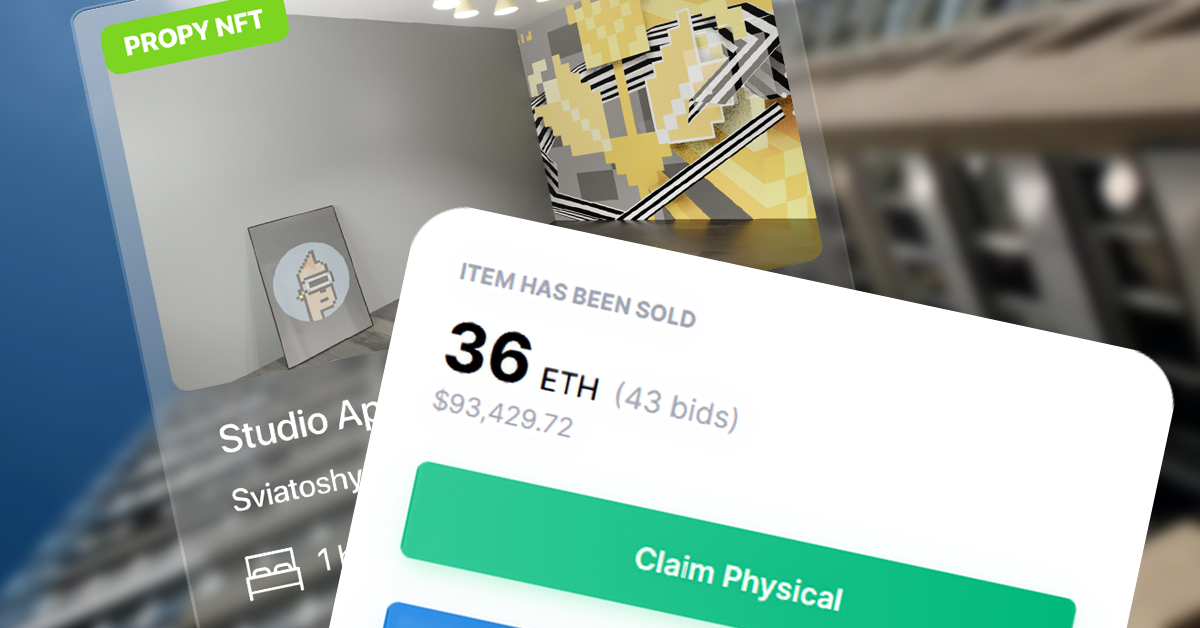
To make the property even more appealing, the NFT also included digital and physical ownership of a piece of art by a famous local street artist, Chizz.
To sell the NFT, we scheduled a 24-hour auction on June 9th, 2021 on SeenHaus, a popular NFT selling platform.
After a stressful 24 hours plus six, 15-min extensions and over 40 bids, the property ultimately sold for 36ETH (around $94,000), which cemented our views that NFTing real estate was a viable option.
The winner was a millenial from Silicon Valley who had never purchased a home before because he felt the process was far too difficult and lengthy. He was thrilled with how easy it was − it took Propy only 22 minutes to transfer full ownership.
The first auction showed us that people who were already purchasing high-value assets such as expensive avatars, or automobiles online, would be willing to purchase property as well. And, they expect the same ease and transparency when buying a property that they experience with these other types of purchases.
Our first RE NFTs within the U.S.
For our first NFT sales in the U.S.,we felt Florida would be a good place to start since the state is pro-crypto.
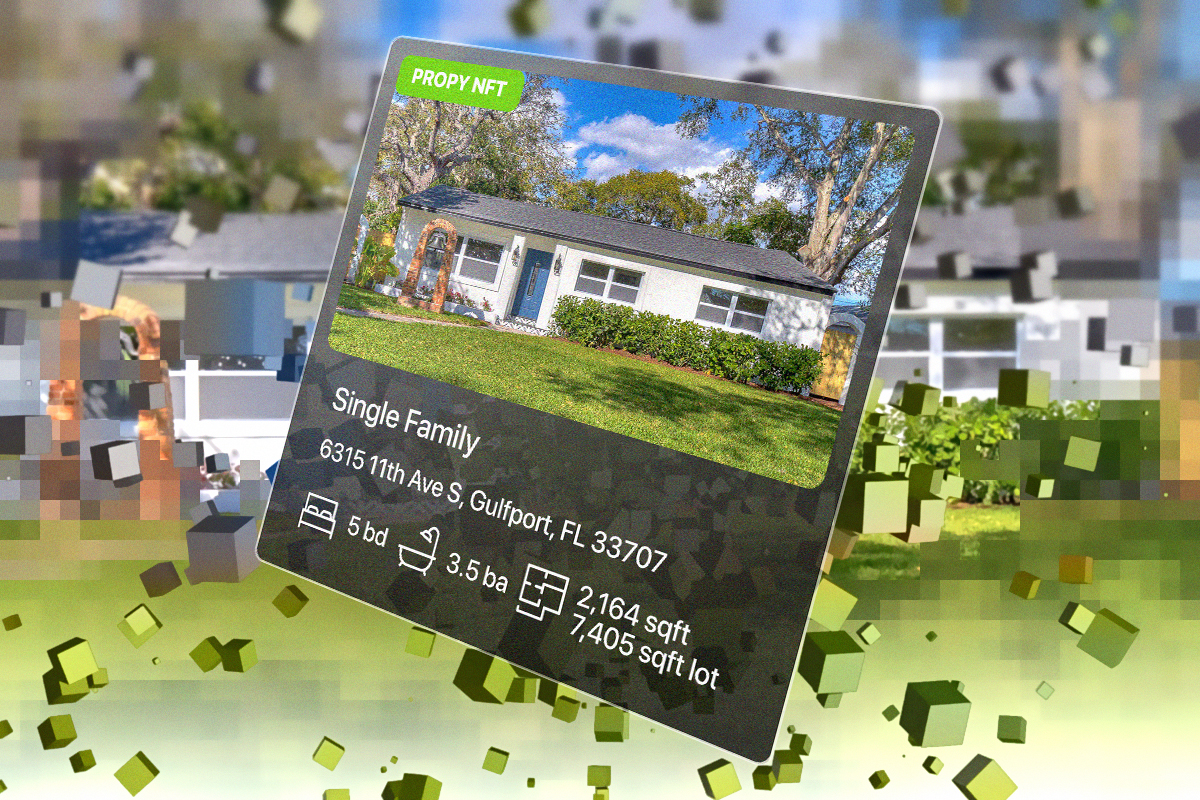
Our first U.S. NFT was completely different. This property was a house in a popular neighborhood in St. Petersburg, FL. The owner was an active crypto investor as well.
On March 12th, 2022, it sold at auction for 210ETH (approximately $654,000). Once again, the property was transferred much more quickly compared to a traditional sale.
Our second U.S. NFT sale will take place on April 12th, 2022. It is a 1-bedroom condominium, located in the Hyde Park area of Tampa (one of the city’s most desirable neighborhoods).
Based on our learnings from the other sales, we’re going to do a few things differently. The sale will be held on the new Propy Marketplace using USDC. The minimal bid will be 185,000 USDC ($185,000).
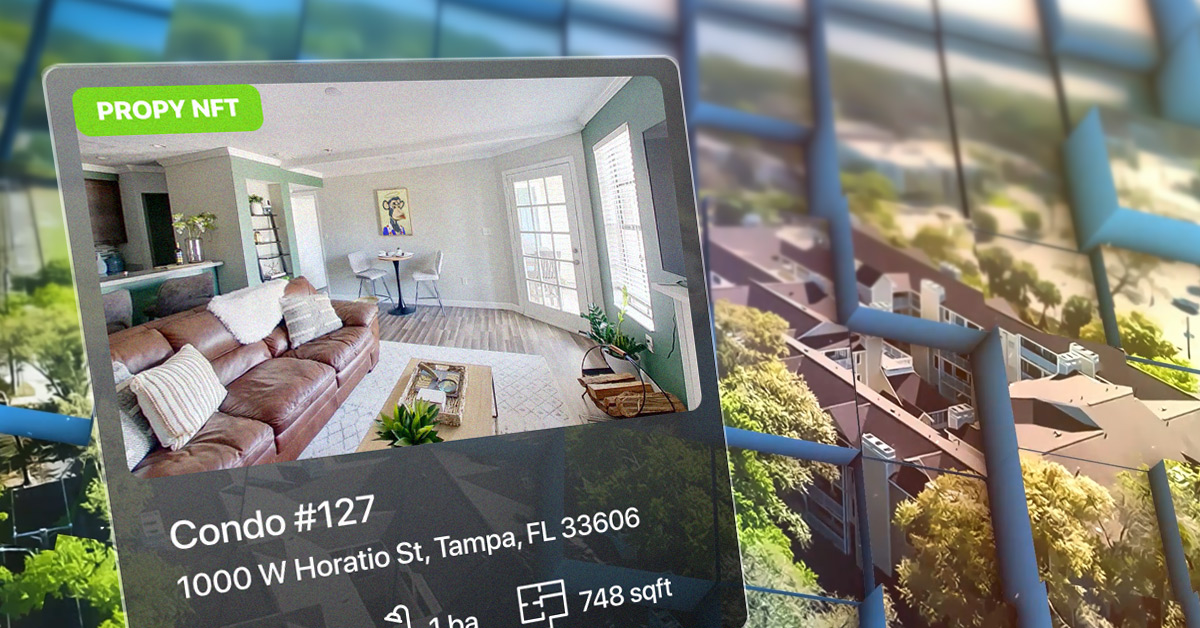
We’ve selected USDC based on extensive research and feedback from the crypto and Propy communities. USDC is one of the most popular “stablecoins” – a coin pegged to a specific currency – in this case, the dollar. 1 USDC will also equal $1, making it much less volatile than other cryptocurrencies.
The sale will also occur on the new Propy Marketplace, which has been developed specifically to list and sell NFT properties. Because a real property NFT has special restrictions, and due to the high demand for future NFT property sales, we thought that launching our own NFT platform was another innovation we could offer to the real estate ecosystem.
What about the agents?
Some agents are nervous that selling property via an NFT means they won’t have a role in the process. That couldn’t be more untrue.
Agents will always be considered a trusted advisor to their clients, and helping prospective buyers and sellers navigate the world of NFTs and cryptocurrency provides opportunities to stand out from the competition.
By educating themselves on these new technologies, agents and brokers can attract a new customer base who wish to use crypto NFT assets. They can also help traditional buyers or sellers manage a crypto or NFT sale.
Mauricio Umansky, CEO of the Agency Brokerage agrees. At a recent Inman Real Estate Connect Conference, Umansky said that when clients become more educated about NFTs, there will be a growing interest in creating NFT real estate with real property. And, that changes in technology always align with changes in the real estate industry. He also believes that NFTs can revolutionize our concept of real estate commodity and what clients will come to expect in a transaction.
What comes next?
The Metaverse. In addition to increased use of these new technologies in the physical world, property sales in the virtual world of the metaverse have exploded. Virtual land in the Metaverse is held as an NFT – and can even include a physical property as well. We expect to see more of these “blended” NFTs in the future. Real Estate agents and brokers can act as advisors for virtual real estate as well. Becoming expert in the different metaverses and sale/resale opportunities.
Security. Higher levels of security and more data integrity will continue to be necessary to circumvent wire and other forms of cyber fraud that is, unfortunately, becoming more common. Real estate settlement on a blockchain using NFT technology can significantly reduce and potentially eliminate this issue.
Royalties. Agents and brokers who help consumers to NFT their homes could be rewarded with royalty fees automatically paid to their digital wallets automatically when the NFT is bought or sold. These “NFT Miners” can receive small royalties for every future purchase as compensation for packaging all of the data and the property to make it transferable (title report, inspection reports, disclosures ect).
Future NFT Opportunities. As the technology continues to evolve, we firmly believe that NFTs can revolutionize the real estate industry – not just amongst younger buyers and sellers and tech-savvy crypto enthusiasts who want to diversify their portfolios, but older buyers and sellers as well.
We are creating a new class of digital assets and we look forward to working with you.
Get your crypto wallet set, bid, and make history with us!
Join our Waitlist and be the first to uncover more details about our upcoming NFT sales.
